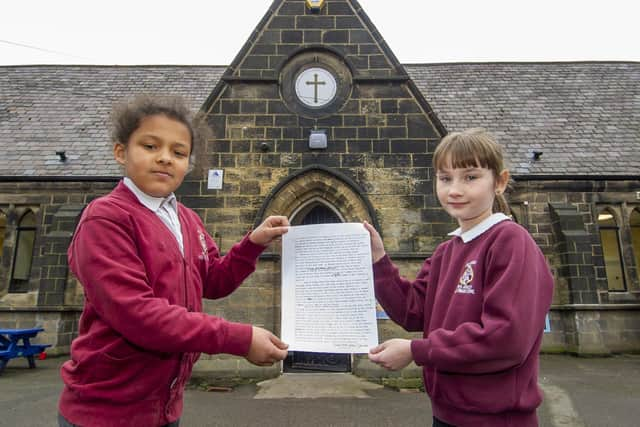Alan Bennett sends a touching memoir to his old primary school in Leeds


Quite apart from the threat of the cane, and the declaration of war the day before he was to have begun lessons, it became evident to him that not all his fellow pupils had been created equal.
In a candid and personal letter to the present-day custodians of his old Primary, he reveals that only his parents’ determination that he should receive the education denied to them, saved him from the same fate as his best friend.
Advertisement
Hide AdAdvertisement
Hide AdAlbert Benson, with whom he shared initials and a desk, was not only brighter but also more self-effacing. But high school, let alone university, was beyond his reach. His family needed him to go out to work.


“I knew then that this was unfair,” he writes in a 500-word memoir to mark the 150th anniversary of the Leeds school he knew as Upper Armley National.
Its current headmistress, Sam Collier, admitted to having had “a little cry” when she read it.
“It’s beautiful. The final paragraph, the part about aspiration, is the one that really gets you,” she said.
Advertisement
Hide AdAdvertisement
Hide Ad“It’s still the key for the children here today. That latent potential is there in all of them.”
Bennett had alluded briefly to Albert Benson in his 2016 autobiography, Keeping On Keeping On, but his letter to the school – hammered out on a typewriter and replete with crossings-out and annotations – takes the story further.
He had arrived at what is now Christ Church Upper Armley School from the village primary in Wilsill, a couple of miles east of Pateley Bridge. His parents had taken him there on the day war broke out, in September 1939.
“Dad knocked at the door of Byril Farm and asked if they would take in Mam, my brother and me,” Bennett recalls – adding that there had earlier been a scramble at Vicar Lane Bus Station as people fell over themselves to get out of Leeds in the wake of Neville Chamberlain’s announcement.
Advertisement
Hide AdAdvertisement
Hide AdThe village teachers were fierce, literally beating the lessons into their charges. “ My brother caught it (the cane) but I managed to avoid it,” Bennett says. He moved back home to Leeds, to when it became clear that the city was not in imminent danger from the Luftwaffe, and found himself sharing teachers with another future best-seller, the romantic novelist Barbara Taylor Bradford, who was a year his senior.
Bennett describes himself as “a real show-off” who had learned to read by looking at his brother Gordon’s comics over his shoulder. But he says he learned a more significant lesson when the entrance exams came round for West Leeds High School.
“Albert didn’t go in for the exam as he wasn’t going to be able to stay on at school,” he writes. “Of course it was free for both of us, as all education should be, but he was having to go out to work.
“My parents had both had to leave school at 12 or 13 so they were determined that my brother and I should have a secondary education. So my time at what is now Christ Church laid the foundations of a belief that I’ve never lost, namely that education whatever one’s background should be free, and all classes of society should share in free education.”
He signs the letter, “Good luck – Alan Bennett”.
Advertisement
Hide AdAdvertisement
Hide AdMs Collier said that although her older pupils knew of him, “they don’t understand just how significant he is. But it’s really important for our children to understand where he went from here – to Oxford and to travel the world,” she said.
Many of them have made the journey in reverse, arriving at what in his day was a school for white working-class families, as new arrivals in Britain.
“It used to be mills and terraces that powered the school. Today we’re multi-cultural with a transient population. At the moment we’ve got refugees new to the country,” Ms Collier said.
The school’s anniversary will also be marked in May by a garden party for ex-pupils.